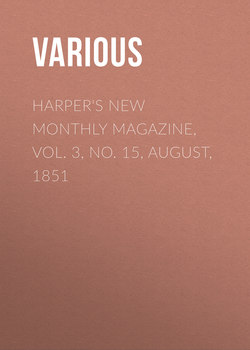Читать книгу Harper's New Monthly Magazine, Vol. 3, No. 15, August, 1851 - Various - Страница 6
VILLAGE LIFE IN GERMANY
A TEMPERANCE MEETING
ОглавлениеA temperance meeting was announced as being about to be held at a village called Blumenthal, situated a few miles from Lesmona. On the appointed day, I proceeded thither with some friends. On our arrival at the place, we found a large canvas-covered booth erected on the border of an extensive wood; this booth was open on every side, being meant as a protection only against the rays of the sun. Adjacent was an inn, a solitary house, the village being at some little distance. Entering here, I was not a little surprised to find the majority of the promoters of temperance drinking wine. It was just ten o'clock of the forenoon. The fact, however, was, first, that many had come from a considerable distance, and stood in need of some refreshment, and secondly, that the pledge given on entering the society went no further than a promise to abstain from ardent spirits. Total abstinence seems not to find much favor in Germany, and the efforts of the Mässigkeit-Verein are directed almost entirely against the use of the deadly branntwein of the country. This branntwein is made from the potato, and is not merely intoxicating, but, even in small quantities, is of a most pernicious effect on the human system, destroying the stomach, and affecting the nerves, even when far from being indulged in to any thing like excess.
At last the meeting began. A clergyman opened it with a short prayer, and then the assembly sang a temperance hymn. The air to which it was adapted was no other than our National Anthem – which, by the way, the Germans fondly but erroneously claim as a German composition. Then came the usual succession of speeches, then another hymn, and then the meeting, it being past noon, adjourned for dinner. The meal was served in the inn, and also in booths similar to that constructed for the meeting; but many had brought their provisions with them, and stretched themselves on the turf under the shade of the forest. Altogether – and especially as a large number of women had attended, and these of all classes, from the peasant in gaudy colors to the more simply-dressed lady – the scene was most picturesque: it looked like a pic-nic on a great scale. After dinner, there were more speeches and more music. The speeches tired me, and I wandered into the wood, where I found the music much improved by being heard at a distance. The fact is, that the country people in this part of Germany are any thing but the proficients in music, which, according to the idea commonly entertained on the subject in Britain, all Germans are. They, on the contrary, know scarcely any thing whatever of the art; even in the churches, part-singing is unknown. While I was at Lesmona, the pastor of that place had indeed begun to instruct the children of his parish in psalmody, and, as he is perfectly competent to do so, a change may ultimately be effected; but in my time the church music was absolutely painful to listen to; the vocal was deafening and discordant, and, as for the instrumental, I shall not to my dying day forget the inhuman turn which old Mr. Müller the organist introduced, and with evident complacency, too, at the end of every two or three bars. Even among the upper classes in the country, music is but scantily cultivated. In Lesmona, for instance, one family, and one alone, paid any attention to the art. That family, however – all its members included – had attained to a very high degree of excellence in it. In the large towns, on the other hand, the case is very different. In Bremen, for example, I heard the Paulus of Mendelssohn given entirely by amateurs, and both in the choruses, and in the solos, the finish of the performance was perfect. In the neighborhood of Hamburg, too, I have met small companies of workmen from the town enjoying a short walk into the country, and singing in parts with admirable precision and ensemble.
But to return to Blumenthal. The meeting at last broke up. As soon as it did, a fire balloon was sent up. What connection, however, this had with the objects of the assembly, I never was able to ascertain.
Since I have introduced the word Verein – union, or society – I may notice one of another kind, a branch of which had its head-quarters at Lesmona. I mean the Gustavus-Adolphus Society. Its object is to unite by a common bond the common Protestantism of Germany. I have not heard lately of its progress and success, but I always greatly doubted of its possibility, and am convinced it can not endure, on its original footing at least. On what common ground (unless it be a negative one, and that is worth nothing), can the evangelical party and the rationalists take their stand? Even while I was in Lesmona, the elements of discord had begun to show themselves; for in that remote nook were found keen partisans; and it was only by a compromise effected with the greatest difficulty that the Lesmona branch of the union did not fall to pieces before it was completely established. And, as for the compromise, such things never last long.
